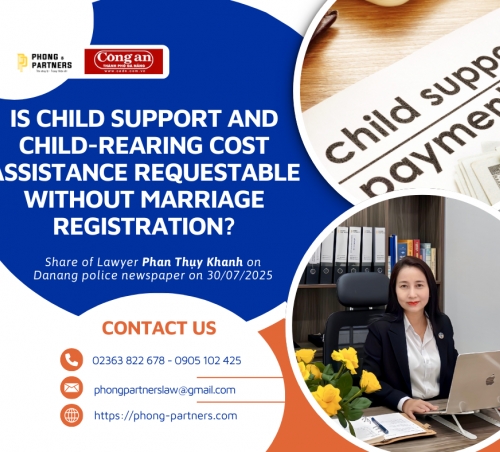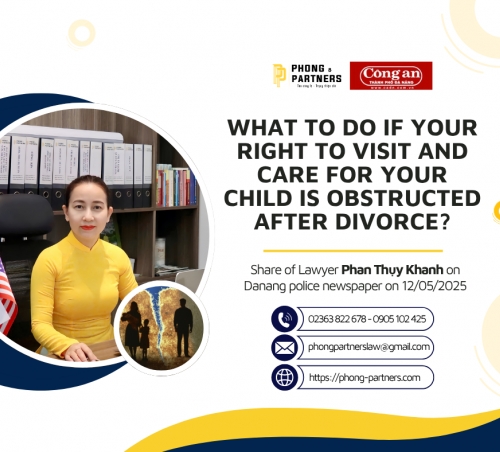Lawyer Phan Thuy Khanh – Deputy Head of Phong & Partners Law Office – Head of Son Tra Branch, answers:
Multinational marriages bring diverse cultural experiences but also presentseveral legal issues when it comes to divorce, especially concerning the child's citizenship. Due to conflicts during a divorce, the custodial parent often wants the child to give up the nationality of the other parent in order to fully raise the child under their own nationality. From an emotional perspective, is this advisable, as it not only affects the child's rights and interests but also their psychology and feelings? Legally, how is this issue regulated?
Procedures for renunciation of Vietnamese citizenship:
Clause 1, Article 28 of The Law on Vietnamese Nationality 2008 specifies the documents required for renunciation of Vietnamese citizenship as follows:
“1. The application for renunciation of Vietnamese citizenship includes:
a) An application for renunciation of Vietnamese citizenship;
b) A personal declaration;
c) A copy of the Vietnamese Passport, Identity Card, or other documents as specified in Article 11 of this Law;
d) A criminal record certificate issued by a competent authority in Vietnam, which must be issued within 90 days before the date of application submission;
đ) Documents confirming that the person is in the process of obtaining foreign citizenship, except in cases where the law of that foreign country does not require such confirmation;
e) A tax clearance certificate issued by the Tax Department where the applicant resides;
f) For those who previously served as officials, civil servants, employees, or served in the Vietnamese armed forces and have retired, resigned, been dismissed, demoted, discharged, or resigned within the last 5 years, an additional document issued by the agency, organization, or unit confirming that the renunciation of Vietnamese citizenship does not adversely affect the national interests of Vietnam.
2. In cases where Vietnamese citizens do not reside in Vietnam, they do not need to submit the documents specified in points d, e, and g of Clause 1 of this Article.
3.The government specifies the documents in the application for renunciation of Vietnamese citizenship."
Clause 3, Article 30 of The Law on Vietnamese Nationality 2008 provides for the exemption of personal verification procedures in the following cases:
“Exemption from personal verification procedures
The application for renunciation of Vietnamese citizenship for those falling under one of the following cases does not require personal verification procedures:
1. Individuals under 14 years of age;
2. Individuals who were born and reside abroad;
3. Individuals who have resided abroad for 10 years or more;
4. Individuals who have exited under family reunification programs."
Based on the information Mr. X. provided, their child, N, is 4 years old. According to the regulations mentioned above, the application for renunciation of Vietnamese citizenship for N. will consist of three copies, including the following documents:
- An application for renunciation of Vietnamese citizenship according to the form TP/QT-2020-ĐXTQT.2 (both parents must sign the application; if the child is aged 15 tounder 18, the child must also sign the application along with the parents);
- An agreement on renunciation of Vietnamese citizenship for the minor child (both parents must sign the agreement);
- A personal declaration according to form TP/QT-2020-BKLL (with a photo taken within the last 6 months);
- A notarized copy of the Vietnamese passport, identity card, citizen identification, or other documents proving Vietnamese citizenship, or submit the original to the competent authority for verification. After renunciation of Vietnamese citizenship, the Vietnamese passport must be returned to void its use (for children under 18, a copy of the passport must be accompanied by a copy of the guardian's passport on pages 2 and 3);
- A copy of the birth certificate;
- Documents confirming that the individual is in the process of obtaining foreign citizenship, unless the foreign country's law does not require these. This document is issued by a competent authority of the foreign country or guarantees that the individual will obtain foreign citizenship; if the applicant already has foreign citizenship, they must submit a copy of the passport or other identification document with a photo issued by the foreign authority to prove their foreign citizenship.
Can Mr. X. renounce his child's citizenship without the mother's consent?
Article 136 of the Civil Code 2015 provides for legal representation of individuals:
“Article 136. Legal representation of individuals
“Father and mother for their minor children
...”
Law on Marriage and Family 2014 stipulates the duties and rights of parents:
"Article 69. Duties and rights of Parents
1. Love the child, respect the child’s opinions; take care of the child’s education and development so that they can grow healthily in physical, intellectual, and moral aspects, becoming a filial child of the family and an useful citizen of society.
2. Supervise, raise, care for, and protect the legal rights and interests of minor children and adult children who are incapacitated or unable to work and have no assets to support themselves.
3. Serve as guardians or legal representatives as prescribed by the Civil Code for minor children and incapacitated adult children.
4. Do not discriminate against children based on gender or parents' marital status; do not exploit the labor of minor children or incapacitated adult children or force children to perform illegal or immoral work."
"Article 71. Duties and rights of care and nurturing
1. Parents have equal obligations and rights in jointly caring for, raising, and nurturing minor children and incapacitated adult children.
2. Children have obligations and rights to care for and nurture their parents, especially when parents are incapacitated, sick, elderly, or disabled; in families with multiple children, all children must jointly care for and nurture their parents."
Based on the above provisions, from a legal perspective, both parents are the legal representatives of their minor children. This means that both parents have equal rights and responsibilities in representing their children in legal matters, including applying for the renunciation of Vietnamese citizenship. Both parents have equal rights and obligations in caring for, nurturing, and protecting their children's rights. All important decisions related to the children must be agreed upon by both parents.
According to the information provided by Mr. X., he and his wife have a 4-year-old child, and he wants to renounce the child's Vietnamese citizenship without consulting the mother. As analyzed, their child is a minor, so both parents are the child's legal representatives. Therefore, both parents have equal rights and responsibilities in representing the child regarding the application for renunciation of Vietnamese citizenship. Mr. X. cannot unilaterally renounce the child's Vietnamese citizenship without the mother's consent.
Furthermore, Mr. X should consider that renouncing citizenship is a significant decision that can have profound consequences not only for current and future rights but also for the well-being of children, particularly minors. When renouncing Vietnamese citizenship, children will lose the fundamental rights that Vietnamese citizens are entitledy, such as benefits in education, healthcare property ownership rights, and other social services. In particular, renouncing citizenship may cause children to feel a sense of loss and disconnection, losing a part of their connection to their homeland through either parentLosing part of their connection to the country and the environment they once bonded with may lead to difficulties in integrating into and socializing with the new community. These issues can have long-term repercussions affecting the children’s psychology, emotions, and future.















